No title
Unique ability of tumour cells
30 Jan 2015

A tumour cell, whose mitochondria do not function because of missing mitochondrial DNA, can acquires these functional organelles from another cell, and thus restart cellular respiration and renew its tumour potential. This is a discovery that rewrites textbook science, notes the popularization web portal IFLScience.
An international scientific team under the guidance of prof. Jiří Neužil from the Institute of Biotechnology of the CAS and Griffith University in Australia in cooperation with researchers from the Malaghan Institute in Wellington, New Zealand has discovered that cancer cells deprived of mitochondrial DNA, after being introduced in the receptor (mouse), have the ability to “renew” their mitochondrial DNA by acquiring it from the cells of the host. This leads to the renewal of the mitochondrial function of the mitochondria in cancer cells. The results is that the cells again acquire the ability to create tumours. This fundamental discovery of the function of a cancer cell was published in the prestigious journal Cell Metabolism (see http://www.cell.com/cell-metabolism/abstract/S1550-4131(14)00554-3).
Genetic blueprint of bread wheat genome unveiled
17 Jul 2014

The zebrafish as an aide in modern haematology
11 Jul 2014

A current trend of modern biomedical research is the attempt to minimalize experiments on animals like mice or chickens and where it is possible to replace them with developmentally simpler model organisms, but it is a necessary precondition that some basic cellular and physiological processes are evolutionarily conserved with these organisms, by which the similarity with the processes taking place in more complex organisms is preserved. One such biological model is the aquarium fish, the zebrafish, named for its zebra-like stripes.
Ultraviolet light enables to find white-nose syndrome in bats
4 Jun 2014

Quantifying the impacts of alien species: towards an IUCN Black List
12 May 2014

One of the major transformations of the planet from human activities is the wholesale redistribution of species, through the deliberate or accidental translocation of their populations to areas outside their native range. These “alien” species have in many cases caused substantial deleterious impacts to the recipient environment (e.g. extinctions of native populations and species, the disruption of soil nutrient and water cycling, and natural disturbance regimes). Preventing and mitigating such impacts is a major drain on limited conservation resources.
New findings on acute myeloid leukemia from the Institute of Molecular Genetics CAS
12 May 2014

New Nikon Centre of Excellence in Super Resolution Microscopy
22 Jan 2014

Epigenetic diversity increases the productivity and stability of plant populations
28 Nov 2013

Humanity is dependent on natural ecosystems as sources of food, but they also provide other essential services. The preservation of biological diversity is a fundamental challenge for contemporary environmental protection. Recent research has found that intraspecific diversity plays an equally vital role in the functioning and stability of ecosystems as interspecies diversity. Intraspecific diversity was until now always attributed to phenotypic and functional diversity of individuals, secured thanks to the variability of DNA. Nevertheless, the phenotype is controlled only by the base sequence of nucleotides in the DNA, but is also controlled by epigenetic variation.
Why does the cuckoo win the battle with its host?
25 Nov 2011

Prof. H. Tlaskalova-Hogenova, CAS, key-note speaker at 7th Annual International SHARE Symposium in Denmark
6 Nov 2013

Copenhagen 6 November 2013: The 7th annual SHARE Symposium in Copenhagen, Denmark on 6 November 2013 has the pleasure of welcoming two keynote speakers. In the morning Professor Bente Finsen, University of Southern Denmark, gives a presentation on “Understanding disease mechanisms in human neurological disorders through studies of mice”, and in the afternoon Professor Helena Tlaskalova-Hogenova, Academy of Science of the Czech Republic, gives a presentation about “The role of microbiota in the immune system development and chronic disease”.
CZ-OPENSCREEN – a new chance in the battle with serious diseases
24 Sep 2013

The HOPX Gene and its Influence on the Metastasis of Tumours
19 Sep 2013






